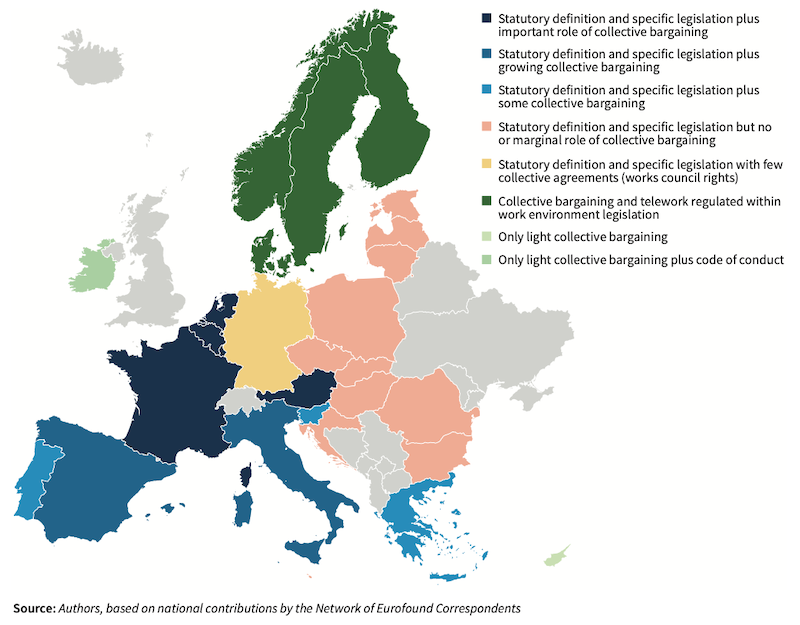Each of the different EU Member States regulates telework based on three models: on the one hand legislation created ad hoc or adapted from existing legislation, on the other hand social dialogue and collective bargaining.
Most EU countries have statutory definitions and specific legislation on telework (Austria, Belgium, Bulgaria, Croatia, Croatia, Estonia, France, Germany, Greece, Hungary, Italy, Latvia, Lithuania, Luxembourg, Malta, the Netherlands, Poland, Portugal, Romania, Slovakia, Slovenia, Spain and Spain). In most of these countries, statutory legislation is supplemented by intersectoral, sectoral and/or company collective agreements, although to varying degrees.
The remaining countries lack statutory definitions and specific legislation dealing with telework, although they have telework agreements in other legislation related to data protection, health and safety, or working time and work in general (Cyprus, Denmark, Finland, Ireland, Norway and Sweden).

This map shows the groups formed between countries based on the regulation they have, ranking them from highest to lowest, for example related to the primacy given to legal legislation and/or collective bargaining and dialogues.
These differences also have an impact on the coverage of provisions and the protection of workers.
It should be noted that following the COVID-19 pandemic, telework legislation in the different countries has increased, which has led to a greater immersion of the different Member States in telework. However, there are still countries that have yet to establish new legislation, and the European Union is waiting for the establishment of EU-wide legislation that will apply to all EU countries.
In the specific case of each of the countries participating in RemotEU:
- Spain: In Spain, telework is regulated at the legislative level and at the state level by Law 10/2021, of 9 July, on telework; this legislation is complemented by collective agreements and agreements established within companies.
- Italy: In Italy, in 2017, the well-known Agile Work Act was passed, which occasionally includes telework. Although it is often confused with telework, they are not synonymous. Agile working, or smart working, is a variant of remote working in which the worker works by cycles and objectives and without precise limitations of time or place of work. This is why, while the teleworker has greater obligations to comply with the timetable established by the company, the agile worker, on the other hand, enjoys total organisational freedom in terms of time and work execution, being able to work by objectives.
- Ireland: In Ireland, there is no legislation governing teleworking, however, there are small collective bargaining agreements and codes of conduct to be followed for remote working.
For more information on the study Telework in the EU: Regulatory frameworks and recent updates.